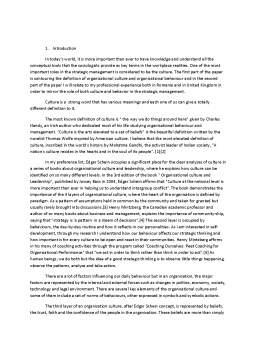Extras din referat
1. Introduction
In today’s world, it is more important than ever to have knowledge and understand all the conceptual tools that the sociologists provide as key terms in the workplace realities. One of the most important roles in the strategic management is considered to be the culture. The first part of the paper is contouring the definition of organizational culture and organizational behaviour and in the second part of the paper I will relate to my professional experience both in Romania and in United Kingdom in order to mirror the role of both culture and behavior in the strategic management.
Culture is a strong word that has various meanings and each one of us can give a totally different definition to it.
The most known definition of culture is " the way we do things around here" given by Charles Handy, an Irish author who dedicated most of his life studying organisational behaviour and management. "Culture is the arts elevated to a set of beliefs" is the beautiful definition written by the novelist Thomas Wolfe inspired by American culture. I believe that the most elevated definition of culture, inscribed in the world's history by Mahatma Gandhi, the activist leader of Indian society, "A nation's culture resides in the hearts and in the soul of its people". [1][2]
In my preference list, Edgar Schein occupies a significant place for the clear analyses of culture in a series of books about organisational culture and leadership, where he explains how culture can be identified on so many different levels. In the 3rd edition of the book " Organisational culture and Leadership", published by Jossey Bass in 2004, Edgar Schein affirms that "Culture at the national level is more important than ever in helping us to understand intergroup conflict". The book demonstrates the importance of the 4 layers of organisational culture, where the heart of the organisation is defined by paradigm. As a pattern of assumptions held in common by the community and taken for granted but usually rarely brought into discussions.[3] Henry Mintzberg, the Canadian academic professor and author of so many books about business and management, explains the importance of community-ship, saying that "strategy is 'a pattern' in a steam of decisions".[4] The second layer is occupied by behaviours, the day-by-day routine and how it reflects in our personalities. As I am interested in self-development, through my research I understand how our behaviour affects our strategic thinking and how important is for every culture to be open and react in their communities. Henry Mintzberg affirms in his many of coaching activities through the program called "Coaching Ourselves: Peet Coaching for Organisational Performance" that "we act in order to think rather than think in order to act".[4] As human beings, we do both but the idea of a good strategic thinking is to observe little things happening, observe the patterns, analyse and take action.
There are a lot of factors influencing our daily behaviour but in an organisation, the major factors are represented by the internal and external forces such as changes in politics, economy, society, technology and legal environment. There are several key elements of the organisational culture and some of them include a set of norms of behaviours, other expressed in symbols and symbolic actions.
The third layer of an organisation culture, after Edgar Schein concept, is represented by beliefs, the trust, faith and the confidence of the people in the organisation. These beliefs are more than simply values, there is an acceptance of the organisational culture in a specific environment. Edgar Schein is defining the beliefs as " non-negotiable values" and "assumptions" .[5]
The fourth layer presented by E. Schein is represented by values, as an individual and as a group. He affirms that "social validation means that certain beliefs and values are confirmed only by the shared social experience of a group" and "any given culture cannot prove that it's religion and moral system are superior to another culture religion and moral system, but if the members reinforce each other's beliefs and values, they come to be taken for granted".[4][5]
When I think about culture, I think about something abstract, something that you can see by as a pattern in the society and you can understand it to your personal limit of self-development. The culture can become a mechanical way of an organisation always growing and developing consensus.
2. Comparative analysis or Garanti Bank Romania and Santander Bank United Kingdom
Bibliografie
1. Charles Handy (1993), Understanding Organisations 4th Edition, Penguin Books
2. www.wiseoldsayings.com/culture-quotes/
3. Edgar H.Schein (2010), organisational culture and Leadership 4th Edition, John Wiley and Sons
4. Henry Mintzberg Program Coaching Ourselves: Peer coaching that changes the world for the better - www.coachingourselves.com/
5. Edgar H.Schein (1985), Organisational culture and Leadership: A dynamic view 3rd Edition, John Wiley & Sons
6. Edgar H.Schein and Charlie Glaize (2016), The Corporate Culture Survival Guide, New and Revised Edition, Audible Studios on Brilliance
7. Steven L McShane and Mary Ann Von Glinow (2010), Organisational behavior - emerging knowledge and practice for the real world 5th Edition, McGraw-Hill and Irwin
8. www.garantibank.ro
9. Group strategy report 2017 www.santander.com
10. George Leonard (1992), Mastery: They keys to success and long-term fulfilment Reissue Edition, Plume
11. www.actualized.org
12. Travis Bradberry, Jean Greaves and Patrick M. Lencioni (2009), Emotional Intelligence 2nd Edition, Talent Smart
13. Peter F. Drucker , Frances Hesselbein, Joan Snyder Kuhl (2015), Peter Drucker's Five Most Important Questions: Enduring Wisdom for Today's Leaders 1st Edition, John Wiley & Sons
Preview document
Conținut arhivă zip
- Organisational culture and behavior - Comparative analysis of Garanti Bank (Romania) and Santander Bank of United Kingdom.docx











